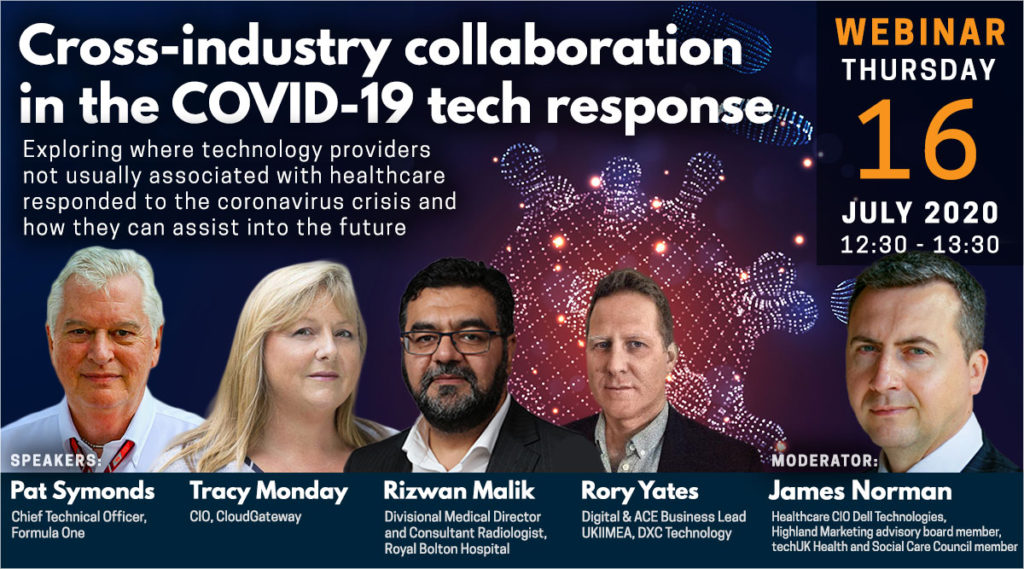The worlds of Formula One, the NHS and technology all responded in new ways to Covid-19. Specialists in each of these fields shared their learnings in a recent webinar hosted by Highland Marketing and techUK. Matthew D’Arcy reports from the virtual pitlanes.
When Pat Symonds received a phone call on 17 March to ask if his motorsport could respond to the coronavirus pandemic ventilator challenge, he immediately thought: “Yes, we can do something about it.”
The Formula One chief technical officer helped to mobilise a team, which met in Milton Keynes at Red Bull Advanced Technologies just days later, on 22 March, along with representatives of clinical bodies, the NHS, the armed forces and health-tech manufacturers. From there, a plan was quickly put into action.
“If you give a Formula One engineer a problem the competitive instinct is always at the forefront, but they are able to look at innovation, ambition and pragmatism in a unique way and can react very quickly,” Symonds told a recent webinar on cross industry collaboration, hosted by Highland Marketing and techUK.
“Grand Prix for the first part of the season had been cancelled. The teams had gone into a voluntary shut down and were sitting idle. It would be a tragedy to have such an incredibly competent group doing nothing.”
Project Pitlane: A race for life saving tech
With several workstreams developed, engineers worked at least 15 hours a day; and often through the night. They came up with solutions, reverse engineered devices, and introduced the latest production techniques to help traditional ventilator manufacturers more accustomed to working with 2D drawings and producing just a handful of ventilators in a typical week.
Project Pitlane, as it became known, saw people excel in areas they weren’t accustomed to. “Certification for medical devices was unfamiliar to us. But we are quick learners,” said Symonds. “Formula One is not into high volume manufacturing; but they managed to do it.”
And do it, they did. The collaboration between Formula One and the med tech community had a sizeable impact on the national capacity for producing ventilators, and even helped the global community, the webinar heard.
Symonds explained how one project saw a prototype, originally intended for the military, bought to production readiness within weeks, rather than the estimated two years that would have ordinarily been required. Another project focussed on producing many thousands of ventilators, saw engineers significantly enhance a device to consume less oxygen, before licensing it to more than 100 countries around the world.
Days before certification, the first of these projects was stood down. “On Good Friday, the Cabinet Office decided it didn’t need the levels of ventilators,” Symonds said. “It was good news, but a disappointment in a way. We were due to certify on the Tuesday.” But it had delivered its purpose. Symonds said: “If at any point it needs picking up again it wouldn’t be difficult to get the whole thing working.”
Willingness to listen – overcoming an ‘arrogance’ in the NHS
Dr Rizwan Malik, a consultant radiologist and divisional medical director at Royal Bolton Hospital, told the webinar that such efforts would have a lasting effect on the UK’s preparedness. Referencing the Nightingale field hospitals that were created to help the NHS to cope with a surge of Covid-19 patients, he said “a lot of people call it a waste because we didn’t need them.
“That is not the case at all,” he insisted. “We now have all this innovation for ventilators from Formula One. We have Nightingales that have stood up. We know how to do it. If we ever need to tap into those potentials, they are there. Everything is in place. We won’t have to wait four weeks next time.”
Malik, who also serves as an associate chief clinical information officer, said that the pandemic had resulted in “an acceleration of people willing to listen” so: “You could quickly put into place things that had already been worked up, but which had sat on shelves: things that hadn’t made that final step to implementation.”
He gave some examples: “In Bolton we introduced an artificial intelligence solution for chest x-rays for Covid-19. We accelerated home reporting. It had been in the pipeline and not going anywhere, but people realised there was a time and place for it.”
He added: “It is no great surprise that when you look back at history the greatest spurts of innovation occurred during world wars or times of great strife. Human mind and endeavour become focussed to get things done. In the steady state we are all really busy people, sometimes busy being busy. We lose that focus that it is important to learn lessons.”
Avoiding regression
Chaired by James Norman, healthcare CIO, EMEA, at DellEMC, the webinar found there was a consensus on the need to build on the progress made during Covid-19, and not to revert to old ways of doing things. Norman, who is also a member of the Highland Marketing advisory board and a co-founder of the Tech4CV19 group, asked his panellists how innovation was being captured and disseminated.
Tracy Monday, chief commercial officer for Cloud Gateway, warned that a “paralysis post-Covid is not a good idea” and “we need to keep moving forward.” Monday said her organisation had witnessed a change during Covid, so that customer decision making in the public sector had “accelerated at a more local level”; speeding up decisions.
She argued that the challenge now is to maintain momentum and co-ordinate innovation because: “Agility, speed, innovation is there, but no one is coordinating it centrally.”
Rory Yates, the analytics consulting and digital engineering business lead for UKIIMEA at DXC Technology told the webinar that collaboration will also be key. He pointed to academic research that suggested the “success of the top companies in the world will be because they can partner better than other companies”.
And he argued the same now applied to effective responsiveness to pandemics. “We have installed huge amounts of human telemetry systems for security reasons: principally to track people [and show] who is where, doing what. These systems have been bought into play during Covid-19. It’s a good example of looking to collaborate faster and looking outside [your sector to] where people have already answered your problems.”
Changing mindsets for the long term
Monday said that although industry offered great innovation to the NHS, the health service was often impeded in its efforts to take it up by concern around outsourcing. “Everyone loves the NHS,” she said, but “[we need to move away from that view of ‘we are selling off the NHS’ to collaborate with industry.”
Malik, as a healthcare professional, agreed. “That mindset [is far more common] in the NHS than throughout the world: you are almost seen as selling out if you look into industry. We absolutely need to get away from that.”
Yates also felt there were gains to be had. “We tend to think we are in the most inventive period in human history. We are not,” he said. “With the internet build out, we have tended to waste time entertaining ourselves. We have actually done little with technology to truly change humanity.”
Genuine collaboration offers an opportunity to start to change that. Malik gave an example: “It is not just the airline industry that can teach us about safety. Formula One is an industry that is used to dealing with people sat close to the ground hurtling around at hundreds of miles per hour. And yet they can do this quickly and safely. We can learn from that; but we choose not to. Getting over that in public sector procurement; that is my biggest frustration.”
Such frustrations have not, it seems, deterred innovators from offering their support for the future. Symonds concluded: “If we did it again, I think we would do an even better job, and I think we did a damn good job this time around. I think there is quite an appetite to do more of it. So, you haven’t seen the back of us, I can assure you of that.”



